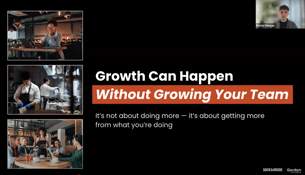Hosting events at your restaurant allows you to create more than just a good time for your customers. Events can also boost revenue on slower nights, build a crowd of regulars (and customer loyalty), attract new guests, and increase brand awareness. When they’re ticketed, events also create a predictable revenue stream, allowing you to staff up and prep food based on exact attendance numbers.
But event planning of any kind takes time and energy. How can you make sure your efforts are successful? Whether you want to host a jazz night, tap takeover, dog-adoption Saturday, or any other number of fun experiences, we break down what to know before getting started.
Lean into your restaurant’s core concept
Events should fit the vibe and clientele of your restaurant. If you’re known for upscale cocktails and small plates, maybe a rowdy trivia night isn’t your jam.
Instead, identify what’s core to your brand, and use your strengths to plan accordingly. If you’re known for your robust wine list, plan a special wine pairing dinner or a tasting night. If you often attract larger social gatherings, consider a themed game night. The goal here is to draw in the right audience so that you can turn first-time diners into repeat visitors while also strengthening loyalty with existing customers.
Use tech to help plan and manage events
When you’re already juggling a thousand other restaurant tasks, managing events can easily feel overwhelming. This is where technology can act as your partner.
Event management software is designed to help you plan, organize, and promote events, enabling you to sell online ticket sales, keep track of expected attendance numbers, and document sales in one spot. Some platforms, like Tripleseat, even include a staff dashboard, where you can assign out tasks and share announcements to keep everyone on the same page.
To get started, consider taking a look at your reservation software. Many platforms, like Resy and Tock, have built-in event management features. Some restaurant website solutions, like Sociavore and BentoBox, also offer ticket management capabilities. A variety of customer relationship management (CRM) platforms, like SevenRooms, feature event management capabilities, too.
All of these solutions help save time and also enable you to create a better guest experience by streamlining ticketing and communications.
Market your events
There’s no such thing as a successful event without an audience, and regular promotion is key to drawing the attention you need. Start by creating an event page on your website. Then, tap into your email list and social media platforms to spread the word. Consider also creating signage to post in-store, and depending on the size of the event, you’ll want to write a press release to send to local publications. You can post the event in local Facebook groups, too.
Then, shift your attention to post-event communications. The best marketing campaigns include follow-up social media posts and email campaigns. This is your chance to show people what they may have missed and also keep the conversation going among event attendees. Take photos during the event to use as marketing collateral, and also encourage customers to tag your restaurant in the photos they post to their own social accounts. This gives you additional free press to share on your own platform. You could even consider inviting a social media influencer to reach wider audiences.
Book acts you can trust
The fastest way to kill an ongoing event is a no-show. Do your research before booking an act. This includes looking at their social media pages, searching for online reviews, and potentially calling other establishments where they’ve previously worked or performed. Acts that you host and promote act as a reflection of your business.





